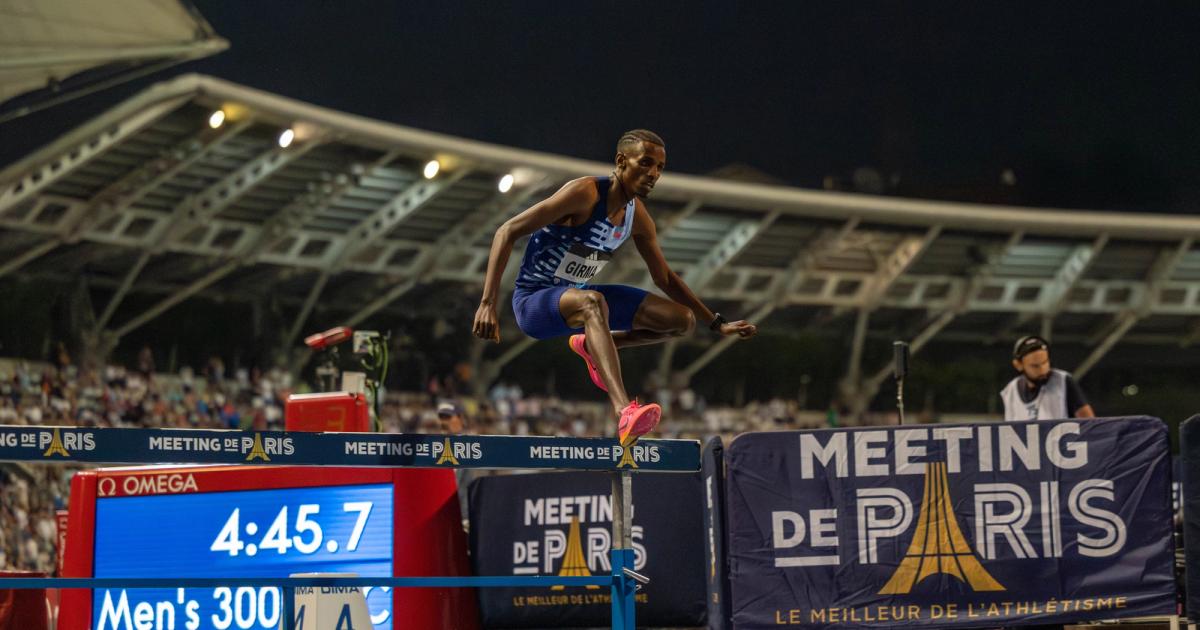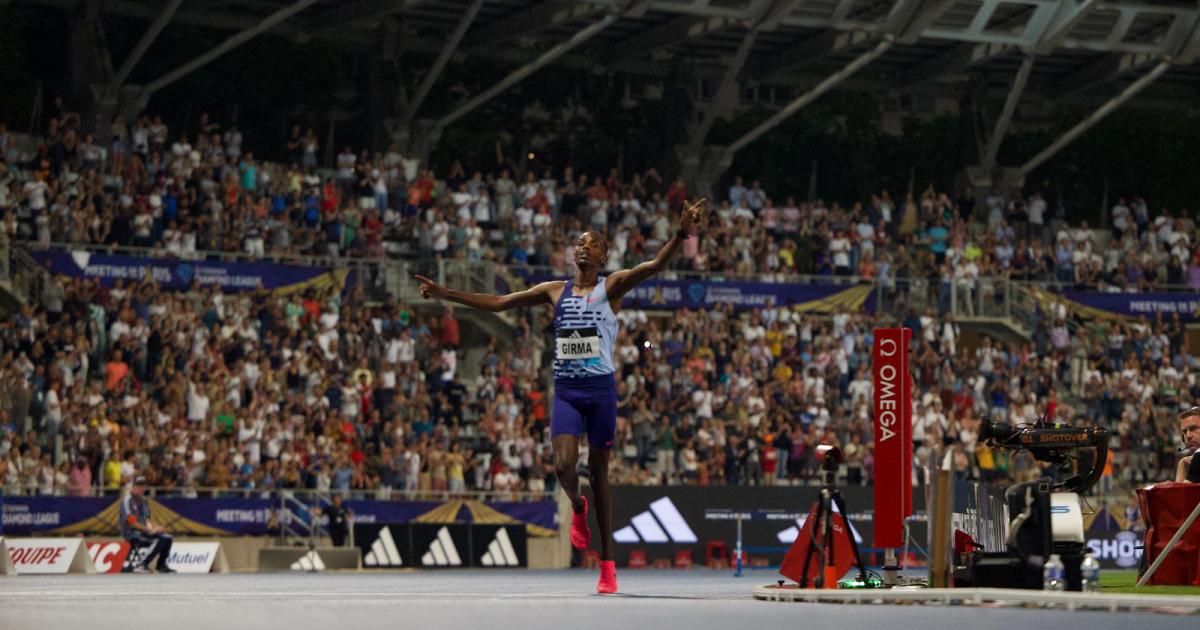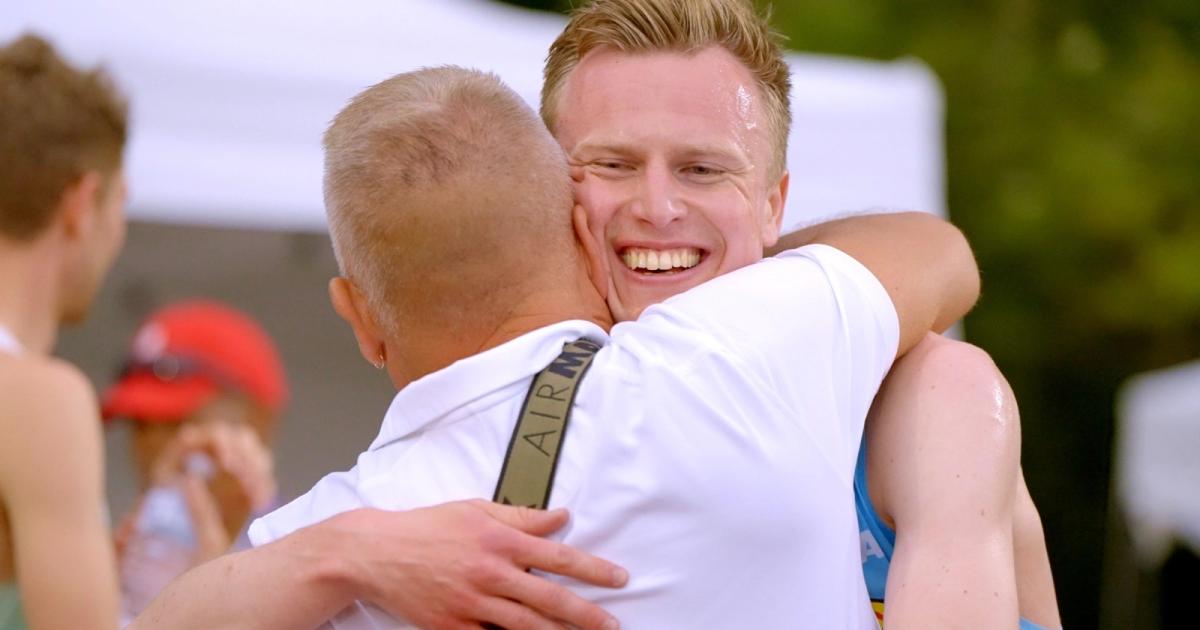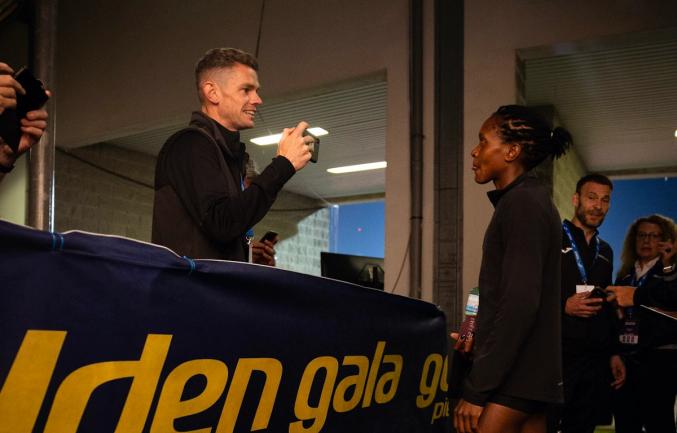By Hannah Borenstein
June 20, 2023
On June 9, Lamecha Girma broke a 19-year-old world record in the men’s steeplechase at the Diamond League meeting in Paris, France, becoming the first Ethiopian to hold this record. Throughout 2023 Girma has made a number of adjustments that appear to be paying off, including a coaching change (he is now being coached by his brother) and a hairstyle change (both of which are discussed below). I sat down with Girma about a week after his WR performance at his home in Sululta, a little over an hour north of Addis Ababa, where he lives with his brothers and a few other family members, to discuss the world record, his training, and life.
The interview was conducted in Amharic (a second language for both of us) and has been edited lightly for grammar and clarity.
Hannah Borenstein: Can we start with you just saying where you’re from, where you grew up, and your family life?
Lamecha Girma: I was born in the Arsi region in Bekoji. I have seven brothers and two sisters. Of us brothers, three of us run and one of my brothers – the oldest – is now our coach. The second is also a runner, and I am the third child. My parents are farmers from the countryside.
How and why did you start running?
LG: Bekoji is an area known for running. So everyone is a runner there – we grow up having seen Kenenisa, Derartu, Tirunesh, and others succeed. When I saw them I started running, and I loved it.
HB: What did your parents think when you started running?
HB: They were very happy when I started running. Our whole family loves sport, it’s part of how we relate to each other. We’re all very into it.
HB: Who was your first coach?
LG: Kefala was my first coach. He lives in America now. When we went to the World Championships in Oregon he stayed there. But when I was in the Academy he was my coach.
HB: How did you get into the Tirunesh Academy?
LG: With the steeplechase, I got in. I did a lot of training and then won some local competitions in the region. Then I was selected to join the Tirunesh Academy.
HB: How long did you stay there?
LG: I was there for two years – from 2010 in the Ethiopian Calendar (2017). I stayed there until the 2019 World Championships.
HB: As I understand it, you then came to Addis Ababa and didn’t speak Amharic. How was that and how did you learn so fast?
LG: The first time I came in 2019 I couldn’t speak Amharic at all. In the countryside it was only Oromina. We had Amharic in school but we didn’t really focus on it because we were all speaking Oromina with each other and at home. When I got here I was so confused hearing Amharic all the time. But with some focus, I started to hear it more. Slowly, I adapted.
HB: Where is the first place you went for a competition outside of Ethiopia?
LG: That year I first went to another African country, Côte D’Ivore. Then to a race in Hengelo [in the Netherlands], then a Diamond League in Paris, then a meet in Belgium, then World Championships.
HB: You didn’t have a lot of international experience before the World Championships in 2019, but you almost managed to win. What was your mindset going into that race? Did you think you could win?
LG: Before the World Championships, in my international competitions I was mostly focused on participating, not winning. For example, in Belgium and the other races, I was thinking about how to learn from participation, but then when I arrived in Doha I was thinking about my results. I was fresh in Doha. I was new. I transitioned my focus from results to winning, but I didn’t have a lot of experience.
Now I think in Doha I could have won if I had more experience. I didn’t know about the lean. The race came down to a lean between me and Conselus Kipruto, but I didn’t know I had to stick my neck out and I lost the race. They determined the winner with a photo and I just missed it.
HB: I thought you were being coached by Coach Teshome at the Academy at that time. Why did you change coaches?
LG: I was with Coach Teshome when I was training with the national team. At that time, Coach Teshome was the coach of the national team. But then I was back with Coach Kefala. But he ran away to live in America after the World Championships. After he disappeared my brother stepped in to coach me. So we started working together in 2023.
HB: How many people are in your new training group in total?
LG: We have five people in the group. Three of us are brothers.
HB: So your brother didn’t have a lot of coaching experience, but he’s already helped coach you to two world records – the steeplechase and the indoor 3,000m. How did you guys learn to work together so well?
LG: My brother is really smart, you know. He was watching athletics very closely. He knows more than us about all the athletes in the world. I didn’t really pay attention. I didn’t know about who is famous in the 1,500m, 3000m, etc., I just didn’t care to learn. But my brother has all the information about the best athletes and their accolades. He pays attention to who the top athletes are each year. He knows who is coming up next. He’s following them. He’s following everyone’s performance. Because of that, he was able to start coaching me.
But also, when he started coaching, he would make a program plan with my input. Because I knew what I did before and what worked. We’ll discuss past training and results. Then he’ll do additional research online and add to what we were doing before. So we added new things to get this most recent result.
HB: What does it mean that you get to train with your brothers, and that your group is so family-oriented?
LG: Working with my brothers is really amazing. Even before, when I was training with other groups, I was hoping I could work with my brothers at some point. They are really good too – they’re top runners. They can keep up, we trust each other, and I wouldn’t want to train with anyone else.
HB: For how long were you thinking seriously about breaking the steeplechase world record?
LG: I started thinking about breaking the record around 2021. I knew, with the timing of the big races, that 2023 could be a good year to try for it. My brothers also told me they knew I could break the record and internally I knew I could, also.
HB: That’s a lot of anticipation. So when you were in Paris, what were you thinking? How did you stay focused and relaxed? Did you take your mind off things?
LG: Before breaking the record, I could only think about breaking the record! I was telling the journalists there that I would break the record so I had to be thinking about breaking the record all day. In a way, that added some pressure. But because I said it aloud I knew I must do it. Then, when I broke it I was of course happy but also relieved. Because I had been talking about it so much it was like a weight had been lifted.
HB: What did you do the day of the race? For example, what did you eat and drink?
LG: I always eat and drink the same things, for training and competition, when I can. On the day of the race I’ll have a big breakfast. I’ll drink juice, eat eggs, and honey. I really like honey. For lunch I’ll usually eat basic foods like rice, pasta, chicken. Then I will sleep for a bit before I go to prepare for the race. The race was at 10 p.m. so I had a lot of time to prepare.
HB: Do you drink coffee before races?
LG: No, I don’t drink coffee. I don’t like coffee.
HB: Can you take me in your head inside the race? What was your plan and what were you thinking? During the race, what were you thinking? It seemed like you wanted to stay ahead of the lights the whole race?
LG: My mentality was this: I knew that if I could see the light, I wouldn’t break the record. So once I was alone I didn’t want to see it at all. When I came through 2,000 meters at 5:12, the lights were far behind, but then I saw them creeping up. Before the final lap I saw the lights out of the corner of my eye and knew I really needed to go, because I saw them coming. I put in an extra push then and then I knew I was going to break the record and I was just elated.
HB: What was it like after the race?
LG: After the race it was overwhelming, everyone was saying congratulations to me. Also on social media, I had so many messages from friends and fans sending their wishes. I had really a big desire to break the record so it was nice to come through. That night I didn’t sleep very much. I only slept a few hours because of all the excitement.
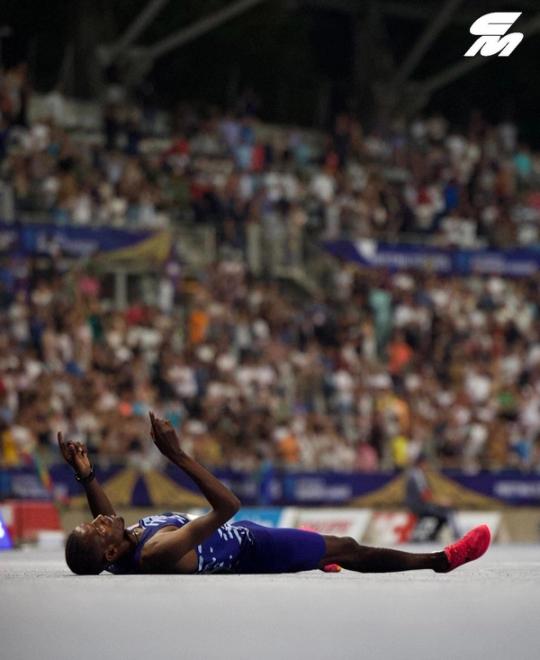
Johnny Pace/@pacephoto
HB: And I heard you had a major celebration when you got back to Addis. What was that like?
LG: It was really wonderful. A lot of people came to the airport to receive me, like coach Haji Adilo and Mesfin Desalegn (the husband of Senberi Teferi), and then we went to my house to have a reception. It was really wonderful. Even some people I didn’t know were coming stopped by the ceremony to say congratulations, which made me very happy.
HB: Did your parents call you? What did they say?
LG: After I broke the record, my parents were happy. But they are always happy after I compete. Whenever I go for a race they say, “you always finish first, second, or third.” They love seeing my results.
HB: Some people have noticed you changed your hairstyle this year, a year you’ve broken two world records. Why is that?
LG: [Laughs] I’ve really liked this style for a long time, and saw some famous people with this hairstyle. No one in particular, but I just decided this would be a good time to change it. I wanted to create a more individual style. And I wanted to create new things this year. I have a right to do as I like, so I decided this new style would work well for new things in 2023.
HB: How are you thinking about carrying this momentum forward?
LG: Now I will just turn my attention to the World Championships. Next week I’m running the 1,500m in Ostrava. It’s not my event but we’ll see how it goes. The main thing is to just race it and get some experience. Maybe in the future I will target the 5,000m world record. But right now I’m just focused on the World Championships.
HB: What do you do to relax outside of running?
LG: Mostly watching films. My brothers like football and watch it a lot. But I don’t really like football. If they turn on a game I’ll usually go into my room and watch a film. I like foreign films, not any particular genre. I just want to see a film that has a good message and gives good advice.
HB: You found success quickly in running, but what do you think is difficult about it?
LG: Running is a hard life. It’s not easy to get results. Yes, I’ve been successful, but you need to do the work. You can’t get good at running by studying the sport. It takes focus, rest, strength, and patience. No matter what, you need to wake up early in the morning, and not make excuses if it’s too rainy or sunny. You just always have to wake up and work hard. You can’t miss training, even one day. You just need to train and then rest, eat, drink, sleep. You have to take care of and build your body. If you don’t take care of your body you will lose your strength.
HB: Right, but I’ve spent a lot of time in Ethiopia, and there are a lot of runners who work very hard. What do you think makes you special? What makes you unique?
LG: You are right, I did become successful immediately. Honestly, it snuck up on me, in a way. But once I started running, it was all I focused on. It is my work and I don’t want to lose this job. I don’t think about other things and I don’t want to think about anything else. My big thing is just to keep creating goals. After I broke the record I still just think about running. In the future when I’m done then I’ll think about other things.
HB: What do you think your younger brothers are learning from you?
LG: I want to show them and the next generation the things that are important. They need to maintain a work ethic, a focus, and have a goal. If somebody works very well he can get what he wants. But to become a big and important person it requires a lot of work. If you have that, and focus, and a goal, you can become successful. But some people forget to focus. And focus is extremely important.
HB: So what do you like about running?
LG: I love running. The sport has completely changed my life. I run for my name now. The world knows me because of running. It’s introduced me to many things and enabled me to travel around the world. Now, I’ve traveled to so many countries and met many important people. If I didn’t start running I wouldn’t know these places or have met these people and built those relationships.
HB: Is there anything else you want to add about your experiences or the world record that we haven’t touched upon?
LG: One thing I want to say was that the organizer in Paris was really amazing. He was an incredibly friendly and sociable person. Some organizers are not like this. Sometimes I travel to competitions and don’t even meet the meet organizers. But he was great with all the athletes. He even came down when we were eating breakfast and asked if the food was okay. He was engaging with all the athletes, and came and said congratulations to me right after I broke the record.
In the future, if I could speak in English, or if he could speak Amharic, I’d love to talk openly like we are now. I only regret not being able to thank him. And I also want to say thank you to my brothers and managers for helping me achieve this goal.
For more storytelling around Ethiopian athletes and to learn more about Hannah Borenstein's upcoming book "Running to Labor: Ethiopian Women Distance Runners in Networks of Capital" – Follow her on Twitter.

Hannah Borenstein
Hannah Borenstein is a writer and professor of Anthropology at Florida International University. She researches and writes about the intersections of gender, race, labor and running, with a particular focus on Ethiopia.
